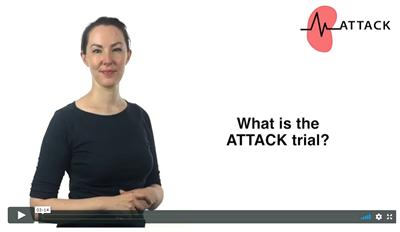Thank you for your interest in the ATTACK Study: Aspirin To Target Arterial Events in Chronic Kidney Disease

Who is this study for?
Some patients will receive a letter from their GP inviting them to take part in ATTACK because tests in their medical record suggest that their kidneys are not be working normally.
If you have received an invitation letter, please read on to find out more...
What are the benefits of taking part?
Until we complete the research, we will not know whether taking aspirin benefits people with CKD, but we believe that the results of this trial will be extremely important for the NHS.
If the benefits of aspirin are shown to outweigh the risks, then treatment will be available immediately to about 3 million people with CKD.
We estimate that this will help prevent around 50,000 heart attacks and strokes across the UK over a five-year period.
This trial may also lead to major cost savings for the NHS, because aspirin is a very cheap drug and the costs of heart attack and stroke in people with CKD are very high (up to £1 billion per year).
What are the disadvantages of taking part?
Low dose aspirin is generally safe but like all drugs, aspirin can have side effects.
The most important side effect of aspirin is bleeding, particularly from the stomach and intestine.
Your GP may prescribe an additional medication to reduce possible stomach irritation.
What is involved if I decide to take part?
If you decide to take part, we will contact you by telephone to make just one appointment for a consent consultation. This will take place by telephone or video call to avoid the risk of Covid-19 transmission. Face-to-face appointment will only be made if national guidelines allow and this is preferred.
A research nurse will discuss the study with you and make sure that the study is suitable for you. You will also be able to ask questions about the study. If you are unsure whether to take part, you can ask to have another consultation or take longer to think about the study before making your decision.
If you are happy to join the study after this discussion, you will be asked to sign a consent form. The consent form confirms that you agree to take part and that you give us permission to look at your computerised medical records (now and in the future) from your GP and from any hospital you attend. Relevant sections of your medical records will be uploaded to the trial database to help with the trial’s analysis. We will ask you to post the signed consent form back to us in the pre-paid envelope provided.
After you have signed the consent form, we will ask some questions about your medical history and also ask you to complete a simple questionnaire.
If you would still like to take part, you will be allocated at random to either take low-dose aspirin once a day in addition to your regular prescribed medication, OR continue with your regular medication alone.
If you take part in the study, it is important that you do not take any “over-the-counter” aspirin (i.e. that has not been prescribed by a doctor). This includes cold and flu remedies that contain aspirin.
Once the study starts, we will find out whether you have had a heart attack or stroke or experienced any episodes of bleeding by analysing your GP and hospital electronic records, and this is why we need your consent to look at your medical records. Once a year, we will contact you by letter or email and ask some basic questions about your health, but you will not be asked to attend any additional appointments.
Will my taking part in the study be kept confidential?
All information that we collect about you during the study will be kept strictly confidential and will be stored securely on a password-protected database.
Only trained members of the research team and individuals from regulatory authorities (people who check that we are carrying out the study correctly) will have access to your records. All of these people have a duty to keep your information strictly confidential.
Privacy Notice
The University of Southampton privacy notice can be found via the following link:
https://www.southampton.ac.uk/about/governance/policies/privacy-policy.page
There is also a specific privacy notice for patients participating in research:
Further details can be found in the Participant Information Sheet for ATTACK. For this study, data will be collected directly from you, and also from your primary care records (via your GP practice) and your secondary care records (via data requests to NHS Digital). This data will only be accessed by relevant people employed by the Data Controller (University of Southampton) or Data Processors (University of Southampton, University of Nottingham, Epsom and St Helier NHS Trust, TCR Nottingham Ltd).